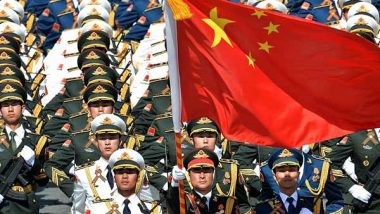Hong Kong, March 6: On 5 March, China announced its defense budget for 2023. Although the world's attention is on Russia's bloody war of attrition in Ukraine, China is continuing to ramp up its military modernization at tremendous pace, with unrelenting year-on-year increases.
According to figures released on the opening day of the first annual session of the 14th National People's Congress (NPC), China's 2023 defense budget will rise 7.2% to CNY1.5537 trillion (USD224.59 billion). China Raises Defence Budget for Eight Consecutive Year With 7.2% Increase to USD 225 Billion.
This was the largest percentage increase in the past four years. Last year, the military budget rose 7.1%, with expenditure increasing to CNY1.45045 trillion. The year before that, defense spending grew 6.8%. China Hikes Defence Budget by 7.2% to 1.55 Trillion Yuan.
This year's amount underscores that the defense budget's rebound is continuing strongly, after "slumping" to a mere 6.6% increase in 2020 as COVID-19 hit hard. Indeed, this year's percentage increase is approaching the 7.5% of 2019 and 8.1% of 2018 prior to the pandemic.
In absolute terms, the 2023 budget is approximately CNY103.25 billion (USD14.92 billion) more than last year. Even though China is not achieving the double-digit percentage increases it enjoyed up until eight years ago, Chairman Xi Jinping is spending far more on the People's Liberation Army (PLA) each successive year. So what does this year's increase tell us?
As Professor Andrew Erickson, Professor of Strategy and Research Director in the China Maritime Studies Institute of the US Naval War College, commented: "US domestic politics aside, here's a single quotation to cut through reams of PRC propaganda papering over decades of major defense spending increases: 'Don't tell me what you value. Show me your budget , and I'll tell you what you value.' (Joe Biden)."
Indeed. Remember that China is now facing stiff economic headwinds, with its predictions for GDP growth in 2023 "about 5%". With its economy hurting because of COVID-19 and Xi's harsh countermeasures, as well as signs of a global recession and amidst strategic competition with the USA, Beijing can still manage to summon a 7.2% increase in defense spending. China's financial year commenced on 1 January, meaning the money is already being spent.
This shows precisely where Xi's priorities lie, as national security and the military are certainly at or near the top in terms of importance. Consider too that Chinese spending on general public services will decline 0.7% in 2023, and education expenditure will increase by only 2%.
Defense accounts for 5.7% of total central government expenditure in 2023, the third straight year it has grown as a proportion. Furthermore, Beijing's defense expenditure has multiplied by five in the past 20 years. To put that in perspective, China's annual surpasses the defense budgets of the 13 next-largest countries in Indo-Pacific, including the likes of Australia, India, Japan and South Korea.
For around two decades, expansion of defense capabilities took a backseat to wider economic growth in China. However, with tighter economic conditions making themselves felt, Xi is prioritizing the PLA.
NPC spokesperson Wang Chao said China's defense budget is an "appropriate and reasonable" amount, and China needs it to "fulfil its responsibilities as a major country". He added that, as a proportion of GDP, the figure is "moderate and below global averages".
Wang assured, "The modernization of China's military will not pose a threat to any country. On the contrary, it will only be a positive force for safeguarding regional stability and world peace."
However, the Chinese Communist Party (CCP) blindly and deliberately ignores the alarm that its military modernization engenders. The PLA continues to exert military pressure on neighbors like India along their shared mountainous border; bullies South China Sea claimants like the Philippines and Vietnam; fans territorial disputes with Japan; and challenges the USA in international waters and airspace. It also brazenly violates the sovereign territory of others to perform surveillance, as its high-altitude balloon program demonstrates.
Significantly, it remains to be seen how strongly Beijing will support Russia's war in Ukraine. Any overt military support to President Vladimir Putin's campaign will intensify tensions and cause a deterioration in China's relations with much of the world.
China continues to paint a narrative that it is simply reacting to events and neighbors around it, ignoring the truth that it is in fact Chinese spending that is ringing alarm bells across the world.
After falling behind China more and more every year, Japan is planning a USD51 billion defense budget this year, up a mammoth 26.3% year on year, but this is yet to be approved by the government. Of course, China will twist this around and say Japan is militarizing and that it needs to respond. However, Japan's defense spending has been almost static for years, and China's defense expenditure is still nearly five times that of Japan's.
Beijing stated in its Government Work Report, delivered for the final time by Premier Li Keqiang: "We made further progress in building up the national security system and capabilities."
Referring to PLA activities in the past year, Keqiang mentioned: "They carried out operations in a firm and flexible way; and they effectively conducted major missions relating to border defense, maritime rights protection, counterterrorism and stability maintenance, disaster rescue and relief, COVID-19 response, peacekeeping andmerchant ship escorting. Our national defense mobilization capability was boosted. With these efforts, we fully safeguarded China's sovereignty, security and development interests."
"Firm and flexible" indeed, as China tested the mettle of India in a dispute in the Tawang sector of Arunachal Pradesh state last December. Additionally, it continues to feed in coast guard, naval and vessels of the maritime militia in contentious spots, and perform dangerous and provocative actions against Western military assets in places like the South China Sea and Taiwan Strait.
Keqiang added: "We should fully implement Xi Jinping's thinking on strengthening the military and the military strategy for the new era. Our armed forces, with a focus on the goals for the centenary of the People's Liberation Army in 2027, should work to carry out military operations, boost combat preparedness and enhance military capabilities so as to accomplish the tasks entrusted to them by the party and the people."
Many remain very worried at these "tasks entrusted" to the PLA by the party. Bludgeoning Taiwan is certainly one of those duties, as the PLA performs almost continuous aircraft sorties towards and around the democratic island nation, and also sends naval ships to threaten Taiwan.
In August 2022, after US Speaker of the House Nancy Pelosi stayed overnight in Taipei, the PLA responded with vindictiveness, implementing exclusion zones on the island's coastal doorstep, and splashing ballistic missiles provocatively close. These coercive efforts by the PLA garnered praise from Vice-Premier Wang Yang at the NPC this week. He praised China's "fighting spirit" in response to foreign sanctions and to Nancy Pelosi's visit.
How does this "fighting spirit" relate to Keqiang's conclusion, "Let us join hands to promote the building of a human community with a shared future and safeguard world peace and regional stability"?
Of course, the two cannot be harmonized, except in CCP minds. On the one hand, China claims to be safeguarding world peace and regional stability, but at the same time it threatens Taiwan with military attack.
Of course, the PLA is a blunt instrument in the hands of the CCP. It will do as the party decrees, as Keqiang acknowledged in the work report. "We remain committed to the party's absolute leadership over the people's armed forces.
A series of major achievements were made in national defense and military development ... The people's armed forces intensified efforts to enhance their political loyalty, to strengthen themselves through reform, scientific and technological advances and personnel training, and to practice law-based governance. They stepped up military training, increased combat preparedness and became a much more modernized and capable fighting force."
The PLA benefits from a non-market economy, where equipment is cheaper and the military has greater purchasing power than in competitive markets like the USA. Furthermore, China gives no details as to how money is allocated. It is estimated that approximately 40% goes on equipment, both new materiel and to sustain existing inventories.
China's paranoia means it is impossible to know what the real defense budget is. Spending areas such as its space program (which is managed by the PLA), extra- budgetary revenues from military-owned commercial enterprises, defense mobilization funds and provincial military base operating costs are not reported in the defense budget. Nor is supplemental funding like military pensions and benefits, civilian/dual-use research and development, and Central Military Commission responsibilities like the People's Armed Police and China Coast Guard. It is easy to say, then, that China's true defense budget is much higher than the declared amount. But by how much is difficult to say, with some estimating the real budget is 25% more, and others that it could be nearly 40%.
Pricey items on the agenda right now include China's third aircraft carrier, new destroyers and cruisers, dozens of J-20 fighters, space technology, nuclear weapons, AI and missiles. Its regular operational sorties and activities in the South China Sea and around Taiwan must be funded too, which requires fuel and causes wear and tear on platforms.
Worryingly, China speaks much of "military preparedness". What is it actually preparing for? War or an invasion of Taiwan? Keqiang said in his work report on 5 March: "The armed forces should intensify military training and preparedness across the board, develop new military strategic guidance, devote greater energy to training under combat conditions, and make well-coordinated efforts to strengthen military work in all directions and domains.
We should improve all-around military governance and build on and expand the gains of national defense and military reform. We should see that military operations, capacity building and combat preparedness are well coordinated in fulfilling major tasks and speed up the implementation of major defense-related projects."
Furthermore, "We in governments at all levels should give strong support to the development of national defense and the armed forces and conduct extensive activities to promote mutual support between civilian sectors and the military. In doing so, we will open a new chapter of unity between the military and the government and between the military and the people."Incidentally, Chinese central government spending on public security will increase 6.4% to CNY208.972 billion in 2023, though this figure does not incorporate considerable provincial spending on public security and policing. This was up from the budget of CNY194.993 billion last year.
Interestingly, the Ministry of Finance reported that public security expenses totaled CNY196.464 billion last year, or 100.8% of the allocated budget.
Keqiang warned that China faces "high winds and choppy waters in the international environment". However, much of this choppiness is caused by its own actions as it seeks to cudgel smaller neighbors, and even foot it with the might of the USA. China will continue to argue that it is a victim of strategic circumstances, and that its defense spending is normal. As a Chinese columnist argued in the Global Times tabloid: "Expressed in US dollars, China's planned defense budget for 2023, $224.79 billion, is even less than 2022's $229 billion, which is another proof that China is not in an arms race with other countries..."
Of course, such a point is irrelevant, given that China does not buy its military equipment nor pay its personnel in American dollars. Chinese protagonists stress that no matter how much money is invested in the PLA, "China will never seek hegemony, expansion or sphere of influence".
But returning to Biden's clairvoyant words, "Don't tell me what you value. Show me your budget , and I'll tell you what you value." Xi clearly values the PLA, military might, internal security, military preparedness and the forceful display of a "fighting spirit".
(The above story is verified and authored by ANI staff, ANI is South Asia's leading multimedia news agency with over 100 bureaus in India, South Asia and across the globe. ANI brings the latest news on Politics and Current Affairs in India & around the World, Sports, Health, Fitness, Entertainment, & News. The views appearing in the above post do not reflect the opinions of LatestLY)













 Quickly
Quickly


